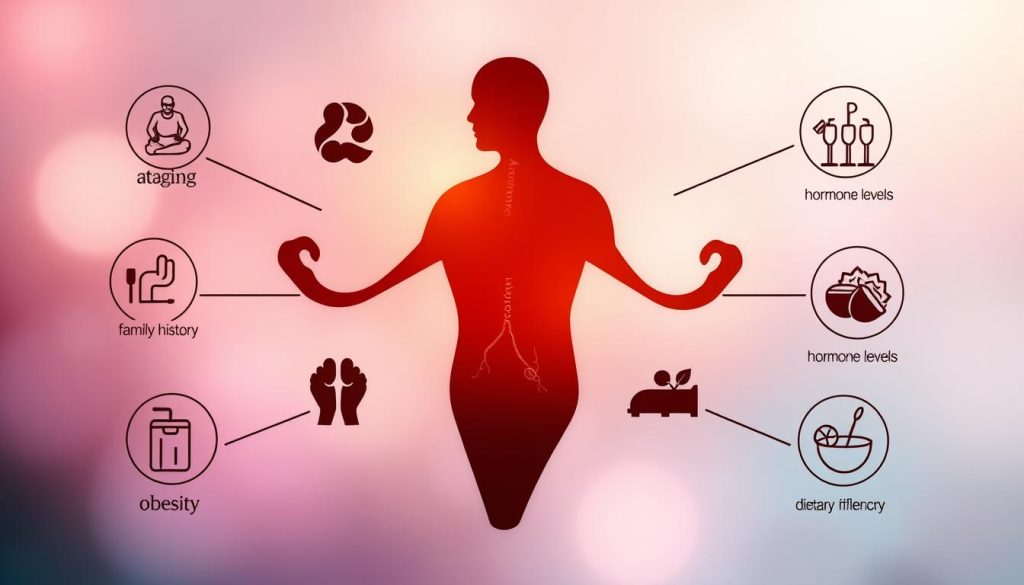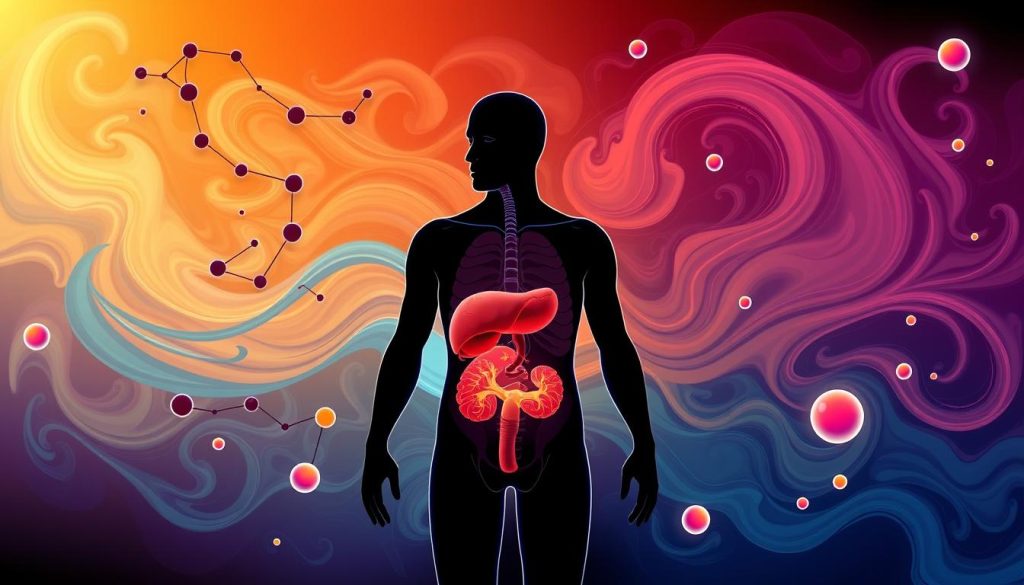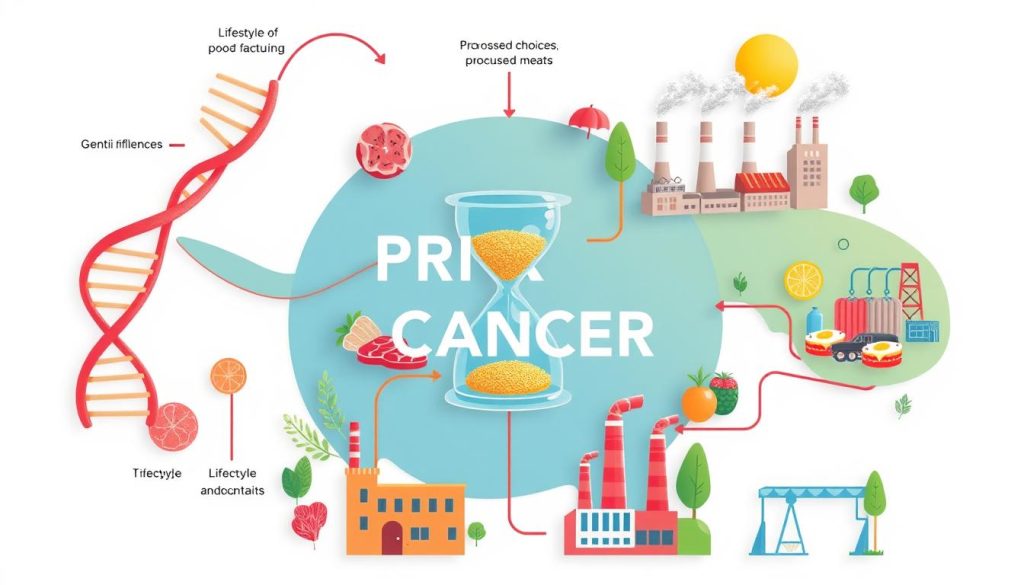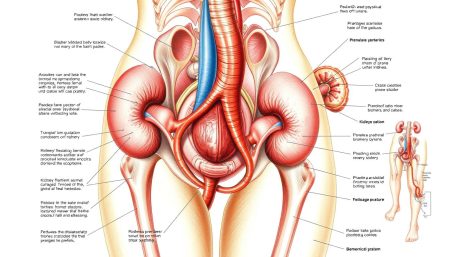Prostate cancer is a complex disease with many contributing factors. Understanding the prostate cancer risk factors is key for early detection and prevention. This article explores the various causes of prostate cancer, shedding light on biological processes and lifestyle choices that may increase risk.
We’ll look into genetic predispositions and environmental influences on prostate cancer development. By examining these factors, we aim to provide a clear picture of what causes prostate cancer. This knowledge empowers readers to manage their health better.
As we explore prostate cancer causes, you’ll learn how age, family history, and daily habits affect your risk. This information is crucial for making informed decisions about screening and lifestyle choices to protect your prostate health.
Understanding the Basics of Prostate Cancer Development
Research on prostate cancer has uncovered the complex steps leading to this disease. It’s key to know how normal cells turn into cancer. This knowledge helps in creating better treatments and ways to prevent it.
The Role of Cell Mutations in Cancer Formation
Cell mutations are central to prostate cancer. These DNA changes can happen on their own or because of outside factors. When genes that control cell growth are affected, cells start growing out of control, a sign of cancer.
How Prostate Cells Become Cancerous
The path from healthy prostate cells to cancer is complex. It starts with small changes that add up over time. As these changes grow, cells may start to grow and divide too fast, forming tumors.
The Impact of DNA Changes on Prostate Health
DNA changes can deeply affect prostate health. Some mutations can lead to different types of prostate cancer, each needing its own treatment. Studying these variations is a major focus of prostate cancer research.
| DNA Change | Potential Impact | Associated Cancer Type |
|---|---|---|
| BRCA1/2 Mutations | Increased risk of aggressive cancer | Hereditary Prostate Cancer |
| PTEN Gene Inactivation | Uncontrolled cell growth | Advanced Prostate Cancer |
| AR Gene Amplification | Enhanced androgen sensitivity | Castration-Resistant Prostate Cancer |
By exploring these basic processes, scientists hope to create more precise treatments. This could lead to better outcomes for those with prostate cancer.
What Causes Prostate Cancer: Key Risk Factors
It’s important to know what causes prostate cancer and its risk factors. This knowledge helps in preventing and catching it early. Prostate cancer is caused by a mix of genetic, environmental, and lifestyle factors. Researchers have found several key factors that raise a man’s risk.

Genetics are a big part of prostate cancer risk. Men with a family history of the disease are more likely to get it. Certain genes, like BRCA1 and BRCA2, can greatly increase the risk.
Age is also a key factor. As men get older, their risk of prostate cancer goes up. Most cases happen in men over 50, with a big jump after 65. This shows why older men need regular check-ups.
Race and ethnicity also play a role. African American men face a higher risk and are often diagnosed later. The reasons for this are not fully known but may include genetics and social factors.
- Diet high in red meat and dairy products
- Lack of physical activity
- Obesity
- Exposure to certain chemicals
Lifestyle and environmental factors can also raise the risk. Eating well, staying active, and avoiding harmful substances can help. By knowing these risk factors, men can take steps to prevent and detect prostate cancer early.
Age and Family History as Primary Risk Factors
Looking into prostate cancer causes, we find key risk factors. Age and family history are at the top. These play big roles in figuring out who might get prostate cancer.
Age-Related Risk Assessment
Men’s risk of getting prostate cancer goes up as they get older. This is a big deal when doctors think about how to find and treat prostate cancer.
| Age Group | Risk of Prostate Cancer |
|---|---|
| Under 50 | Low |
| 50-65 | Moderate |
| Over 65 | High |
Genetic Predisposition and Family Patterns
Family history is a big deal when it comes to prostate cancer risk. Men with family members who had prostate cancer are at higher risk. This shows how important family health history is in finding prostate cancer.
Hereditary Gene Mutations
Some gene mutations can make a man more likely to get prostate cancer. Mutations in genes like BRCA1 and BRCA2 are known causes. Finding these genetic factors is key in diagnosing prostate cancer.
- BRCA1 and BRCA2 mutations
- Lynch syndrome
- HOXB13 gene alterations
Knowing these risk factors helps doctors find cancer early. This can lead to better treatment plans for those at higher risk.
Lifestyle and Environmental Risk Factors
Knowing about prostate cancer risk factors helps men make better choices. While some risks can’t be changed, lifestyle and environment offer ways to lower cancer risks.
Diet and Nutritional Influences
Some foods may affect prostate cancer risk. Eating lots of fruits, vegetables, and whole grains can help. On the other hand, eating too much red meat and dairy might raise risk. Tomatoes, full of lycopene, might protect against it.
Physical Activity and Body Weight
Staying active and at a healthy weight is key for preventing prostate cancer. Being overweight can increase the risk of aggressive cancer. Try to do at least 150 minutes of moderate exercise or 75 minutes of vigorous activity each week.
Environmental Toxin Exposure
Some environmental toxins might raise prostate cancer risk. Pesticides, industrial pollutants, and certain plastics are examples. Cutting down on these exposures is a smart move for prevention.
| Lifestyle Factor | Potential Impact on Prostate Cancer Risk | Preventive Measures |
|---|---|---|
| Diet | High red meat intake may increase risk | Consume more fruits, vegetables, and whole grains |
| Physical Activity | Regular exercise may reduce risk | Engage in 150+ minutes of moderate exercise weekly |
| Body Weight | Obesity linked to higher risk of aggressive cancer | Maintain a healthy BMI through diet and exercise |
| Environmental Toxins | Some chemicals may increase risk | Minimize exposure to pesticides and industrial pollutants |
Racial and Ethnic Risk Considerations
Research on prostate cancer shows big differences in risk among racial and ethnic groups. African American men have a much higher risk of getting prostate cancer. This makes it key to focus on early screening and prevention for them.
African American men are not just more likely to get prostate cancer. They also get it younger and with more aggressive types. The reasons for these differences are complex, involving genes and environment.
“Understanding racial disparities in prostate cancer is crucial for developing effective prevention and treatment strategies for all communities.”
Genetics play a part in these differences. Some genetic mutations linked to higher prostate cancer risk are more common in certain groups. Also, things like healthcare access and diet play a role in these gaps.
| Race/Ethnicity | Relative Risk | Average Age at Diagnosis |
|---|---|---|
| African American | 1.7x higher | 66 years |
| White | 1.0 (baseline) | 69 years |
| Hispanic | 0.8x lower | 68 years |
| Asian/Pacific Islander | 0.5x lower | 70 years |
It’s vital to understand these racial and ethnic risks for better prostate cancer screening and prevention. Doctors should take these factors into account when talking about cancer risk and screening plans with patients.
Hormonal Influences on Prostate Cancer Development
Hormones are key in prostate cancer growth. Knowing how they affect it helps us understand prostate cancer causes and treatments.
The Role of Testosterone
Testosterone, the main male hormone, helps prostate cancer grow. It binds to receptors in prostate cells, making them divide. This can sometimes cause cancer cells to form.
Hormone Therapy Effects
Hormone therapy is a common treatment for prostate cancer. It lowers testosterone levels or blocks its effects. But, it can cause side effects:
- Hot flashes
- Decreased libido
- Fatigue
- Bone density loss
Age-Related Hormonal Changes
As men get older, their hormone levels change. These changes can affect prostate health and cancer risk:
| Age Range | Hormonal Change | Potential Impact |
|---|---|---|
| 40-50 | Slight testosterone decrease | Minimal prostate changes |
| 50-60 | Noticeable testosterone decline | Increased prostate cancer risk |
| 60+ | Significant hormonal imbalance | Highest prostate cancer risk |

Understanding these hormonal effects is vital for prostate cancer treatments and prevention. Regular check-ups and monitoring hormone levels are key for early detection and managing prostate health.
Preventive Measures and Risk Reduction Strategies
It’s important to take care of your prostate health to prevent prostate cancer. Regular exercise and a healthy weight can lower your risk. Eating more fruits, vegetables, and whole grains, and less red meat and dairy, may also help.
Early detection is key in managing prostate cancer. Look out for symptoms like frequent urination, weak urine flow, or blood in the urine. If you see these signs, see your doctor right away. Regular check-ups and screenings, especially for men over 50 or those with higher risk factors, are crucial.
Reducing exposure to toxins and quitting smoking can also help. Some studies show that vitamin D or selenium supplements might offer benefits. But, always talk to your doctor before trying them. While you can’t control all risks, these steps can greatly improve your prostate health and overall well-being.
FAQ
Q: What are the main causes of prostate cancer?
A: Prostate cancer is caused by many factors. These include genetic mutations, age, family history, and hormonal influences. Cell mutations in the prostate gland can lead to cancer. These mutations may be inherited or develop over time.
Q: At what age does the risk of prostate cancer increase?
A: The risk of prostate cancer goes up with age. Men over 50 face a higher risk. The average age of diagnosis is about 66. Yet, younger men can also get it, especially if they have a family history.
Q: How does family history affect prostate cancer risk?
A: Family history is key in prostate cancer risk. Men with a first-degree relative diagnosed with prostate cancer face a 2 to 3 times higher risk. This risk grows if more close relatives are affected or if the cancer was diagnosed young.
Q: Can lifestyle choices influence prostate cancer risk?
A: Yes, lifestyle choices can affect prostate cancer risk. Eating a lot of red meat and dairy may increase risk. But, eating fruits, vegetables, and whole grains may help. Exercise, a healthy weight, and less alcohol can also lower risk.
Q: Are certain racial or ethnic groups at higher risk for prostate cancer?
A: Yes, racial disparities exist in prostate cancer risk. African American men face the highest risk. They are 1.8 times more likely to develop prostate cancer and 2.2 times more likely to die from it than white men. The reasons include genetic, environmental, and socioeconomic factors.
Q: How do hormones affect prostate cancer development?
A: Hormones, like testosterone and DHT, play a big role in prostate cancer. They can make prostate cells grow, both normal and cancerous. That’s why hormone therapy is used in treatment to lower androgen levels or block their effects.
Q: What are the early symptoms of prostate cancer?
A: Early prostate cancer often has no symptoms. As it grows, symptoms like trouble urinating, frequent urination, and blood in urine or semen may appear. Pain in the hips, back, or chest can also occur. These symptoms can also be from other conditions, so regular screenings are key.
Q: How is prostate cancer diagnosed?
A: Prostate cancer is diagnosed with tests like the PSA blood test, digital rectal exam (DRE), and imaging tests like MRI. A biopsy is needed to confirm the diagnosis by examining tissue samples for cancer cells.
Q: What are the stages of prostate cancer?
A: Prostate cancer is staged from I to IV. Stage I is the least advanced, and stage IV is the most advanced. The staging system looks at the tumor size and spread, lymph node involvement, and distant metastasis. This helps doctors choose the best treatment.
Q: Can prostate cancer be prevented?
A: While there’s no sure way to prevent prostate cancer, some strategies may help. Eating a healthy diet, exercising regularly, maintaining a healthy weight, and not smoking can reduce risk. Some studies suggest certain medications may also help, but more research is needed.


















